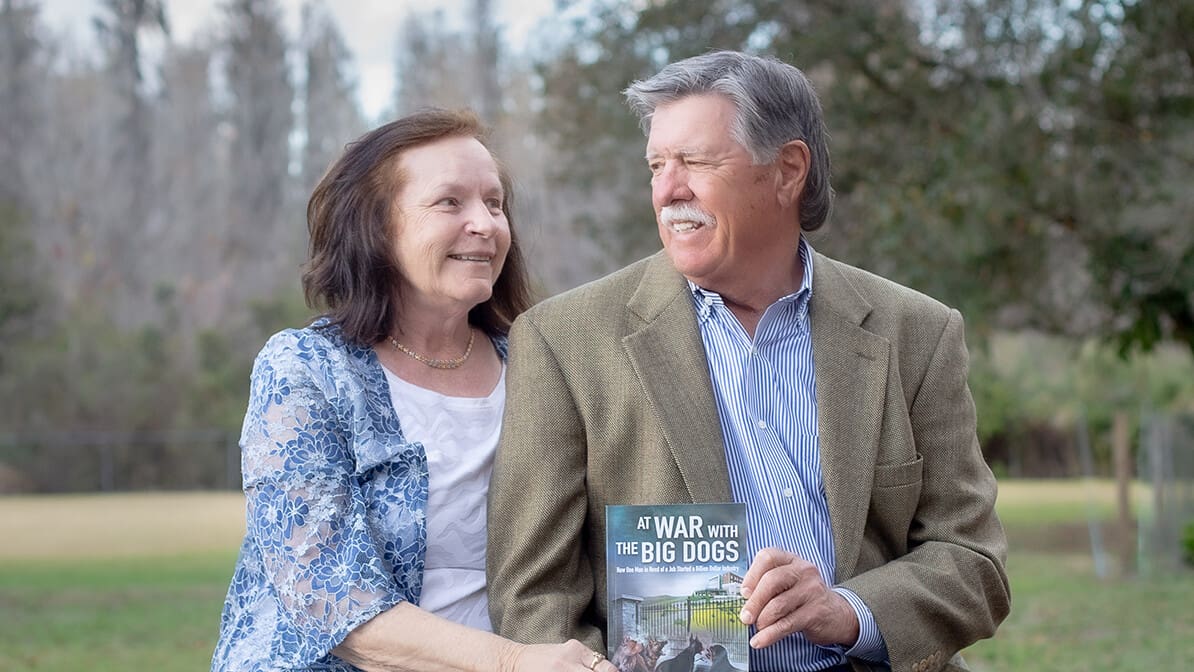
Chuck Masek: At War with the Big Dogs (Part 1)
John Farrell: Could you please tell me a little bit about your book, At War with the Big Dogs?
Chuck Masek: The book is a true story about a company my wife and I started back in 1992. We decided to start reprocessing devices labeled single-use by the manufacturer. These are medical devices.
Since Medicare got involved in 1965, from 1970 till about 1980, the disposal shot up. It became the second-highest cost into the surgical suite right next to employees. And what happened was the manufacturers started labeling everything single-use: metals, hard plastics, et cetera.
So, the book is about our trials and tribulations going from starting the company, trying to get the FDA to regulate us, and then what the manufacturers did to try to stop us. They used every tactic, legal, illegal, ethical, and unethical to try to stop us.
The reason I wrote the book was two-fold. Number one is to honor the men and women who served with us during this war so they can show their children or grandchildren, “This is what mom or dad did during this great crusade.” So to speak. The second reason I wrote the book, is maybe there are other entrepreneurs that find themselves up against the wall. I want to let them know that the fight does not always go to the big dog. That’s what the book’s about.
This whole journey of about fifteen years. We survived by the grace of God and here we are today.
JF: Is that the message you hope readers take from the book?
Chuck: I think so. People who’ve read the book that do not know me have given me very positive feedback. It’s a page-turner they say. They said that my wife’s upbringing and my upbringing were very difficult.
My father was a World War II vet. He fought in the Battle of Okinawa. He came back home and had PTSD. It was difficult to be raised by him although he was a very honorable man. A good guy. He just had these explosive tempers that came out of nowhere. I only put one story in the book about one thing he did, but there were hundreds of them.
My wife came from a similar background. Her mother did harmful things to her, psychologically speaking. And yet we survived and got married. We had four children and just celebrated our 50th Anniversary. I think what most people take away from the book is that they see it as a battle of David and Goliath because that’s exactly what it was.
A True David Versus Goliath Story
JF: Congratulations on your anniversary!
Why is that message so important right now in today’s society?
Chuck: I don’t know if this is as important today as it’s important all the time. All throughout history – we see this going back to David and Goliath – anytime you want to change something, particularly when you’re changing things that affects people’s income, there’s a battle. You see it with electric cars. You see it with the pipelines that take oil from Texas. There’s always a battle. Anytime you change economic things there’s always a battle.
I don’t think it’s just today. I think it’s all the time and will continue in the future because that’s the nature of man.
Growing Up
JF: What did you learn about yourself from writing this book?
Chuck: You know, it’s interesting. I learned that although I thought my upbringing was bad and harmful, what I learned was it turned out to be really good because of what my mother taught me through her actions. She taught me to be mentally tough.
I was a small kid growing up. I wasn’t very athletic in terms of being one of the big kids, but I’m one of the most mentally tough people you’re ever going to find. That was due to my mother making me that way. And my father too. I thought it was bad because he was tough growing up, but I was able to deal with life situations and compare them to my upbringing and think this is no big deal at all.
I think all things work together for good. But in this case, what I thought was bad turned out to be helpful in my career.
JF: Could you please tell me a little more about your challenging upbringing and what that was like?
Chuck: If you deal with people with PTSD – and my mother also had her own issues – the problem is it’s random. You can never predict it. Now what I got good at is managing my father’s outbursts. I can usually make a wisecrack to bring it back to normal, but sometimes I couldn’t.
Sometimes I can predict what’s going to happen. Sometimes I couldn’t. And that’s what makes it most scary. You don’t know what’s going to set the person off. For example – I put this in the book – my brother spilled some milk on the table and my dad went ballistic over it. It was just a glass of milk.
Those are the things that affected me and my wife too from her upbringing. For example, my wife’s mother told her one time that she had a black heart. She’s five years old. What mother tells her child she has a black heart? Most people would be destroyed by that, but my wife is mentally tough also.
Those are some of the things that happened to us growing up. And there’s many more stories, but those are some of the big ones.
The Military and Starting Out
JF: So why did you choose to join the military after seeing your father struggle with PTSD that he got as a result of being in the military?
Chuck: That’s a really good question. And the answer is simple. Our upbringing was challenging.
I graduated from high school in 1968 with a 1.999 average. They only graduated me because there was a war on and I wasn’t mature. I went to college for like two months, and all I did was drink beer and chase women. I resigned from college. I withdrew passing and they sent me to the draft board. I was 1A so I was getting drafted.
I joined the Air Force to avoid the draft. And I got my draft notice while I was in basic training for the Air Force. But I was there more because there was nowhere else to go. And that was due to my upbringing too. It was one of those things where everything’s going a certain way, so I went right into the military. Not because I loved the military but because I had nothing else going for me.
JF: So, fast-forward a couple of years. You changed jobs quite a bit before finding your true passion. What were some of the struggles you faced during those transitional years?
Chuck: It’s funny you ask that question because I always wanted to go somewhere. I always wanted to be ahead. I didn’t know where ahead was, but I wanted to be there. And after we became successful, I asked, “Is this all there is?” See, part of that is chasing the dream. The dream once it’s completed, it’s sort of anti-climatic.
All during my time, I always wanted to go somewhere and with every step or every job change – I think we moved nineteen times in the first thirteen years of marriage and we had four children each in a different state – I was always chasing this dream. During those times, I started several minor companies. Here’s a good example. In 1982 or so, my mother sent me an article from the Florida paper saying they’re going to stop using cardboard boxes to collect needles and instead use plastic, which kind of sounds funny now.
I found this company called Louise Antiplastics that made ice cream containers. They were about a gallon. I bought those and put a little tape on them. I sold them all over the area. I was making a lot of money. Doing about maybe $4,000 a month, but I was making probably about $3,000. Then I sold that company.
I did many of those companies along the way. So, I always thought I could do something. I always thought I was smarter and that I could do more things. That’s probably not true, but I was always wanting to do more things.
That’s when the last company I started was the successful one. But I lost everything at forty years old. I made a $2 million investment in Haiti, which is not the nicest place in the world. At forty years old, I’ve got four children under the age thirteen and we’re about to lose a house. It was a very sobering time to try to find out who I am because when you lose everything, you self-examine yourself. Who am I? What happened here? How could this happen? I did a lot of soul searching, but my wife supported me. We got back on our feet and started back over from day one and went on to start this other company.
…
Order your copy of At War with the Big Dogs: How One Man in Need of a Job Started a Billion Dollar Industry by Chuck Masek
Trending Now
Sign up today for your Inspiration Today Daily Newsletter
Supercharge your faith and ignite your spirit. Find hope in God’s word. Receive your Inspiration Today newsletter now!
John Farrell
John Farrell serves as the Digital Content Manager at Inspiration Ministries, where he oversees the planning, organization, and management of website content to support the ministry's global digital outreach. With a strong background in writing and editorial strategy, John ensures that the articles, devotionals, and discipleship resources on Inspiration.org are accurate, engaging, and aligned with the ministry's mission.
John has authored more than 1,000 articles, press releases, and features for Inspiration Ministries, NASCAR, Lionel, and Speed Digital. His versatility as a writer is also showcased in his 2012 book, The Official NASCAR Trivia Book: With 1,001 Facts and Questions to Test Your Racing Knowledge.
A graduate of Appalachian State University, John brings excellence and attention to detail to the digital experience at Inspiration Ministries. He lives in Concord, N.C., with his wife and two sons.
Related Articles
January 29, 2026
5 Traits of Good Leadership
The traits of good leadership aren’t just about results—they’re about relationships. Servant…
December 9, 2025
End-of-Year Giving Benefits: Tax Savings, Legacy Gifts & Stewardship
As the year draws to a close, many believers take time to reflect on God’s goodness, their personal…
November 29, 2025
What Does the Bible Say About Finances?
Learn what the Bible teaches about money, giving, and contentment. Explore 10 scriptural principles…
November 20, 2025
Can You Smile at Your Future?
When you make the Lord your dwelling place amid life’s storms, you can rest confidently in His…
Next Steps To Strengthen Your Walk
Inspiration Today Newsletter
Supercharge your faith and ignite your spirit. Find hope in God’s word. Receive your Inspiration Today newsletter now!
Christian Articles
Find articles to strengthen your walk and grow your faith. We have a wide range of topics and authors for you.
Submit A Prayer Request
We are here for you. Simply click on the button below to reach us by form, email or phone. Together we will lift our hearts and voices with you in prayer.






